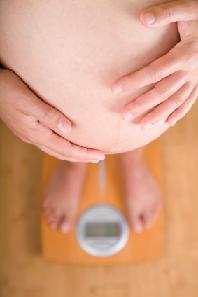What is normal weight gain in pregnancy?
 The usual weight gain in pregnancy is 10-12 kg, which works out to approximately one kg and a bit every month of pregnancy.
The usual weight gain in pregnancy is 10-12 kg, which works out to approximately one kg and a bit every month of pregnancy.
Weight gain patterns vary considerably though. Larger women tend to gain less weight in pregnancy than this.
Excess weight gain
Excess weight gain has an association with a having larger baby, gestational diabetes and hypertension in pregnancy. But for most women there are no pregnancy concerns.
The good reason for watching your weight gain in pregnancy is because the more weight you put on the more weight you have to take off to get back to your pre-pregnancy weight once the pregnancy is over. There has been many a woman who has ‘lost her figure’ because of excess weight gain in pregnancy
It is also known that women who gain excessive weight during pregnancy are at higher risk of having overweight or obese children. Childhood obesity is on the increase and is associated with many health and psychological challenges for the child. As well if you don’t learn how to eat healthy before you are pregnant what hope do you have of your child eating healthy foods?
What can be done?
Attention to your diet and adequate exercise are both important.
Optimal diet Avoid food which are more likely to result in excessive weight gain. Another reason for avoiding these foods is that they are usually unhealthy for you and so your intake should be minimised whether or not you are pregnant. Such foods include snacks and sweets, fast foods (such as KFC, McDonald’s, Hungry Jacks, pizza, etc), excessive fat content foods, processed cheese, full cream milk, refined white sugar, sugary beverages including soft drinks, donuts, potatoes (including potato chips and french fries), excess alcohol, pasta, fried food (such as fried chicken), white bread, low-fiber breakfast cereals, processed meats and desserts.
It is not recommended you go on a weight reduction diet in pregnancy. Just eat sensibly. Remember you are eating for two not one.
Exercise You should not join a gym, etc because you are pregnant and want to get fit. But if you do go to the gym, participate in gym classes, play sport, etc. you can continue with consideration of the need to be extra careful because you are pregnant. You will be more accident prone because you are pregnant. Avoid contact sport and potentially dangerous sports, recognising you won’t able to to perform as well as you are pregnant.
For most women brisk walking on a regular basis is all that is done in the way of exercise in pregnancy.
Don’t stress. If you are doing your best then don’t get stressed. Remember some of your weight gain will be due to fluid retention and baby, which will go after you have your baby.
Also see

